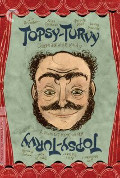
Directed by
Mike Leigh
160 minutes
Rated M
Reviewed by
Bernard Hemingway


Topsy Turvy
Synopsis: The 1885 London West End theatre premiere's Gilbert and Sullivan's new operetta, "Princess Ida" to lukewarm reception. Arthur Sullivan (Alan Corduner) is in poor health and resolved to break his contract with impresario D'Oyley Carte and his relationship with W.S. Gilbert (Jim Broadbent). Despite his aspiration to be regarded as a serious classical composer, Sullivan goes on to write one of the team's best-known works, "The Mikado".Writer-director Mike Leigh has built his reputation with finely observed and strongly committed stories of day-to-day life in contemporary Britain in films such Life Is Sweet (1990) and Naked (1993) So it is with apprehension that one goes to see a Leigh film with Gilbert and Sullivan as its subject matter. Is this going to be some kind of social allegory or historical account of class-driven exploitation and abuse?
Breathe easy. Topsy Turvy is a wonderful wild card in the director's career, a seemingly dearly-loved personal project that, having marked his terrain and established his credentials as social commentator, Leigh has brought to the screen with the devotion of a passionate hobbyist, much as a Prime Minister might pursue his Sunday painting and surprise everyone, once the results are exhibited, with their quality.
Despite interweaving a storyline about musical theatre with performed numbers, Topsy Turvy is not a backstage musical. Despite having at its core two famously-twinned theatrical figures it is not a period drama, nor despite the presence of their female foils, a romance (although Lesley Manville is touching as Gilbert's neglected wife). Rather it is an extraordinarily detailed observation of the circumscribed late-Victorian world of Messrs. Gilbert and Sullivan (there are noticeably few exteriors) which appears to have no other justification than a fascination with its subject. Set and costume design are a marvel. From the domestic interiors to the theatrical performances, the attention to detail is flawless without being fetishistic. Leigh's writing and direction are completely convincing within their theatrical confines (at least for someone who knows nothing about G&S ) and though elements (Gilbert's odd family, his relationship with Sullivan, some of the behaviour or idiosyncracies of the minor characters) come and go with little development this film presents more a splendiferous diorama of a bygone world than a conventionally plotted narrative.
Leigh's fondness for the curiosities of individual characters, however, is given full reign here and the performances are, without exception, excellent. Leigh fans will recognise many of the players from his earlier films, notably Tim Spall who appeared as the incomparable Aubrey in Life Is Sweet and who has worked regularly with the director ever since. Another Leigh favourite, Jim Broadbent, who played the lead in the same film, is wonderful as the gruffly obtuse W.S Gilbert, appearing as the central figure in the story, a distinctly English character whose creative genius was a cross between Lewis Dodson and Rupert Bear. For me, however, Alan Corduner's puckish Sullivan was invariably entertaining and a delight in his every scene.
Sadly when I saw this film there were only two other people in the cinema. Despite its glories, at 2hrs 40 mins this film pushes the envelope of viewer patience with material of already limited appeal and Leigh would have been better advised to be stern with himself in the editing particularly in the case of the Mikado numbers. Notwithstanding, one can only wonder if Hollywood has so adulterated the public imagination with harsh words, pumped-up pecs and fisticuffs that a film such as this is no longer viable. Let's hope it has done better in its home market but while it's still on a big screen near you, if you love words and music, the theatre or, of course, Gilbert and Sullivan, buy a ticket and enjoy Leigh's labour of love.
Want something different?





